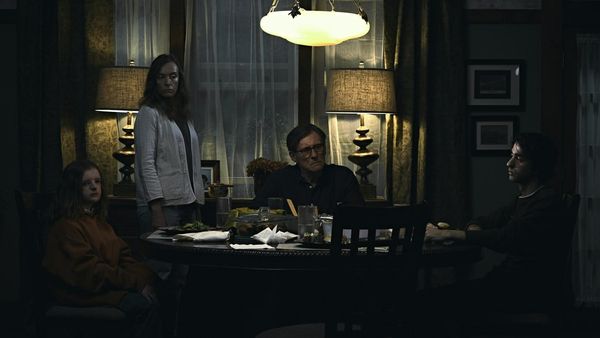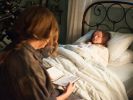Eye For Film >> Movies >> Hereditary (2018) Film Review
Hereditary
Reviewed by: Owen Van Spall

Star Toni Collette is superb in director Ari Aster’s Sundance horror sensation Hereditary. The film burst out of the US festival earlier this year with the kind of favourable buzz that eased the way for The Babadook and Get Out. Comparisons to The Babadook are particularly understandable given both films centre on an unstable female protagonist who is an unreliable narrator (as well as parent), but the comparisons can be overdone.
I personally found Aster’s film incredibly unsettling, one of the closest approximations to the kind of nightmares that really shake me that I have seen on film recently. The night terrors that stay with me are those where I’m unsure where the real world ends and the supernatural takes over, and where waking up results in a flash-moment where dreamscape and the real world overlap. Watching Hereditary recalled that to a certain extent. Those going into Hereditary should be warned that not only is this flick not entirely similar to The Babadook but the marketing materials for the film - particularly the posters that feature a miniature house lit spookily from within - might create the wrong kind of expectations. Nor is it really helpful to call this ‘the next Exorcist’. Rest assured though, despite a two-hour run time that suggests a slow-burner, the film will make you jump. And you will never think about tongue clicks in the same way.

What about those weird miniature houses though? Well, they are naturally a handy metaphor for how we can be shrunk down to irrelevant size by the loss of control, and the vulnerability of a family unit to menacing forces peering in from outside. Aster actually opens the film with a striking zoom onto what appears to be a miniature of a bedroom, only for the entrance of a character into the room to break the spell and reveal this is a real place. But the miniatures are also fascinating, real objects within the film; the life work of Toni Collette’s character.
Collette plays Annie Graham, an American artist who is famed for creating miniaturist doll’s house, which mostly are based on scenes from her own life, tiny lit rooms with Lilliputian human figures, fixtures and fittings all fabricated with a frankly eerie level of detail and care (there is a real-life American artist Narcissa Thorne, whose work is similar, and may be an inspiration). It is, of course, tempting to read into this a form of deep-rooted control freakery or some kind of pathology (or curse?), and given that when we first see Annie when she is giving a very bleak reading at her mother’s funeral, we also start to sense that the Grahams might be a family with deep roots of damage. Annie’s mother, we learn, was elderly, secretive and abusive, and only died after years of dementia. Right away, we wonder how this mysterious matriarch affected not just Annie, but her steady-the-ship husband Steve (Gabriel Byrne) and their teen children Peter (Alex Wolff) and Charlie (Milly Shapiro). As Annie hisses through her teeth during the funeral, her grandma insisted on taking Charlie under her wing, and even though she is dead, she fears her ‘hooks’ are still in her child.
It is difficult to talk about what happens over the next two hours without spoiling, but suffice it to say that Aster crafts the downfall of the Graham family, and reveals the shadow they live under, with real craftsmanship. It really starts with loner teenage granddaughter Charlie (a great performance from Milly Shapiro, who has fascinating gaze that really conveys the sense of seeing something beyond), who starts catching visions of her grandmother outside her school, before graduating on to dissecting animals and unsettling her family with strange, sudden tongue clicks. Then a truly gruesome and bizarre tragedy strikes, and the domestic turmoil this unleashed is so effectively conveyed by the cast, particularly Collette, that Hereditary could actually have just stopped right there with the supernatural elements and carried on as a great character study of grief.
One dinner scene, conducted in the family’s gloomily-lit and oddly doll-like house (the rooms just feel too neat to seem lived in), sees Collette’s character escalate to such a frightening level of savage accusation that the film reaches an almost hysterical pitch of unease. This happens many other times, with Annie’s uncontrollable outbursts against her hapless son Peter (Alex Wolff really nails the look of a person exhausted by the process of falling apart), who was involved in the aforementioned tragedy and thus has twisted the family’s response to it even more, revealing such deeply-buried and unspeakable truths that you night find yourself emitting a guffaw of shock. This grounding really helps the film, as few things are more terrifying that seeing bad things happen to believably frail people.
But it is not over for the Grahams, not by a long shot. Aster’s script, the production design, editing and a precise nerve-jangling score from Colin Stetson all work in slick teamwork to ratchet up the feeling of delirious dread as the family members increasingly isolate themselves, and thus fall further prey to the forces trying to get at them. I particularly liked the film’s trick of snapping from day or night in exterior shots in a single beat, like switching the lights in a doll’s house on or off with a switch. Grace Yun’s production design and Pawel Pogorzelski’s cinematography for the outdoor scenes make the Graham residence look like another miniature house in a totally isolated space, cut off from any help, which is complimented by the aforementioned square-on compositions that make the interiors look uncannily like replicas with live occupants. Interspersed with all this are a few jump scares so well-constructed that it overrides the fact some are straight out of the oldest playbook in existence. By the time you get to the WTF ending (which, despite my ambiguous feelings about it, doesn’t diminish my appreciation), you will probably be wanting to steer clear of doll’s houses for a good few months.
Reviewed on: 03 Jun 2018

















